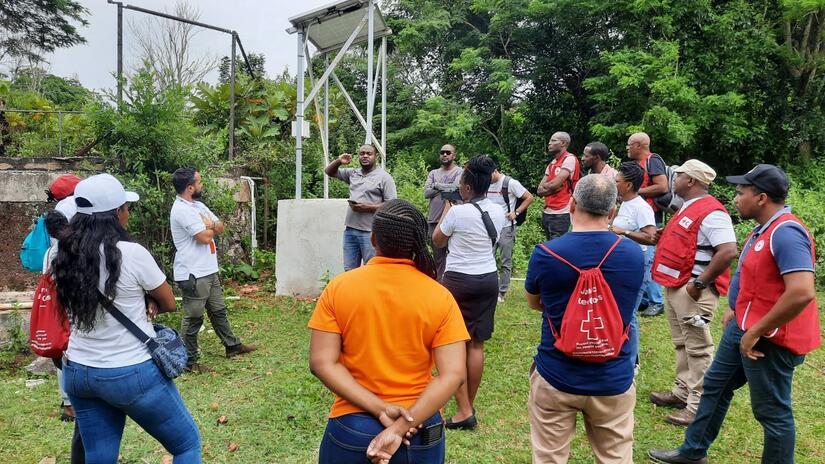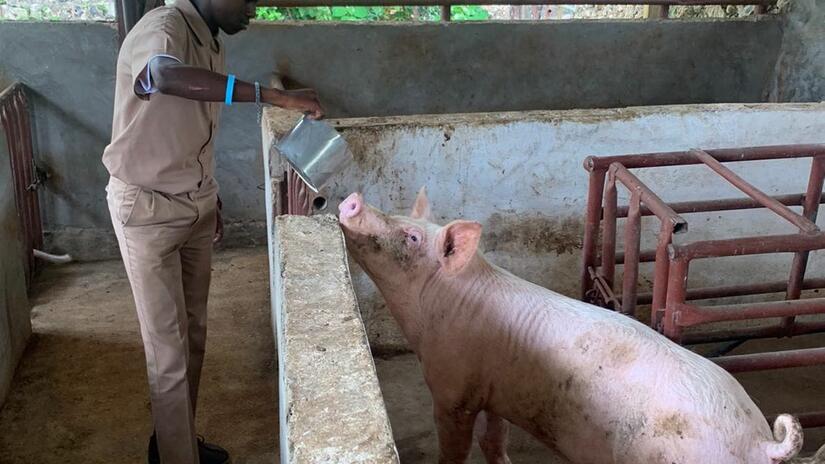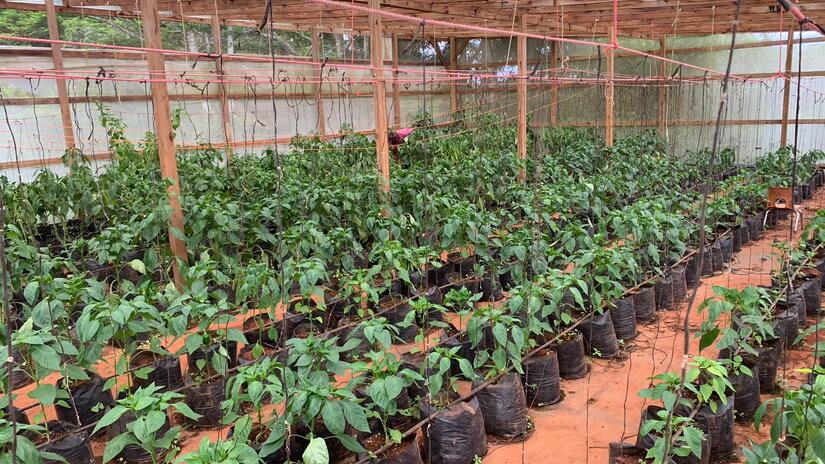Planting, watering, weeding, harvesting and feeding the animals have long been part of the life at the Caribbean Christian Centre for the Deaf (CCCD) in Manchester, Jamaica. On any given day, staff and students at the school’s Knockpatrick Campus might be harvesting beans, squash or vegetables as part of the educational nutritional and livelihoods program.
But when the economic fallout of the Covid-19 pandemic led to dwindling enterprise earnings and donations to the school, the administration placed even more focus on using their land to assist in producing some of their internal food demands. In the meantime, however, there were other challenges: persistent drought meant that there simply wasn’t enough water to adequately irrigate the campus’ greenhouse and open field crops
That’s when the school turned to “climate-smart” agriculture. With support from the Jamaica Red Cross (JRC), the Knockpatrick campus now uses solar powered pumps to help harvest and store water for its greenhouse and farm. The CCCD had previously installed a water catchment system in the 1960s, but the system has been in a state of disrepair.
Tyreke Lewis, one of 130 students who lives at the 130-acre Knockpatrick campus, says the improvements have turned things around for the better. “The school will also be able to produce more goods to be sold to the community and other stakeholders,” he says. “The additional income will help us to pay our bills and other expenses. It will allow us to develop our skills to become more self-reliant for the future.”

Red Cross staff and volunteers from across the Caribbean listen to representatives from Konnexx Services Ltd. explain how the solar powered water pump (in background) works, during a field trip to the Caribbean Christian Centre for the Deaf (CCCD).
Photo: IFRC
An island going dry
The Knockpatrick Campus is not alone in facing the impacts of climate change. According to the Meteorological Services of Jamaica, all parishes received below normal rainfall in December 2022.
Combined with COVID-19, changes in the climate have resulted in major humanitarian consequences, with the poorest and most vulnerable feeling the brunt of its effects through loss of life, economic setbacks and livelihood loss.
As part of its plans to help people affected by the climate crises and the socio-economic effects of COVID-19, the JRC connected to the CCCD through the Rural Agricultural Development Authority (RADA).
“In our discussions with the CCCD, we realized that the drought and water scarcity that existed, coupled with the reduced income generation due to COVID-19, compounded the food crisis, pushing them to produce more for themselves,” said Leiska Powell, JRC project manager. “But to do that, they needed assistance to manage their water for improved and increased production. We wanted to find a way to help them do this.”

Kenardo Parkes, a student at the Caribbean Christian Centre for the Deaf (CCCD) feeds one of the pigs reared at the CCCD Knockpatrick campus.
Photo: Caribbean Christian Centre for the Deaf
Climate-smart farming
To get things done, the JRC contracted a local company that provides alternate energy solutions to install the solar water pump and provided four, 1,000-gallon water tanks to help facilitate additional water storage.
The initiative involved building a ramp to house the four water tanks and installing a solar water pump to move the water from the current catchment tank to the new storage drums to supply the greenhouse with water.
John Meeks, social enterprise officer at the CCCD, noted that this partnership with the Red Cross marks the first step in their strategic bid to develop a climate-resilient and climate-smart agricultural programme.
“Without irrigation, we can’t plant or raise animals,” he says. “This initiative, therefore, provides a key step in the right direction and will allow us to expand our crop production from 2-3 acres to up to 10 acres, because we now have the irrigation system in place.”
The next phase of the initiative will see the JRC collaborating with RADA to offer climate smart agriculture training to students and staff of the CCCD to further build their capacity in sustainable agriculture and water management. There are also plans to expand the climate smart agriculture initiative to the other CCCD campuses, once additional funding is secured.
The partnership also now forms a central part of activities undertaken through the COVID-19 climate-smart livelihoods recovery initiative, conducted by the JRC and supported by the IFRC, added Keisha Sandy, IFRC technical officer for climate and environmental sustainability for the Caribbean.
“The Red Cross network is committed to helping people in communities make the transition from immediate recovery to the socioeconomic impacts of COVID-19, to long-term climate smart livelihood solutions geared towards increasing the sustained resilience of the communities we serve,” Sandy says.

